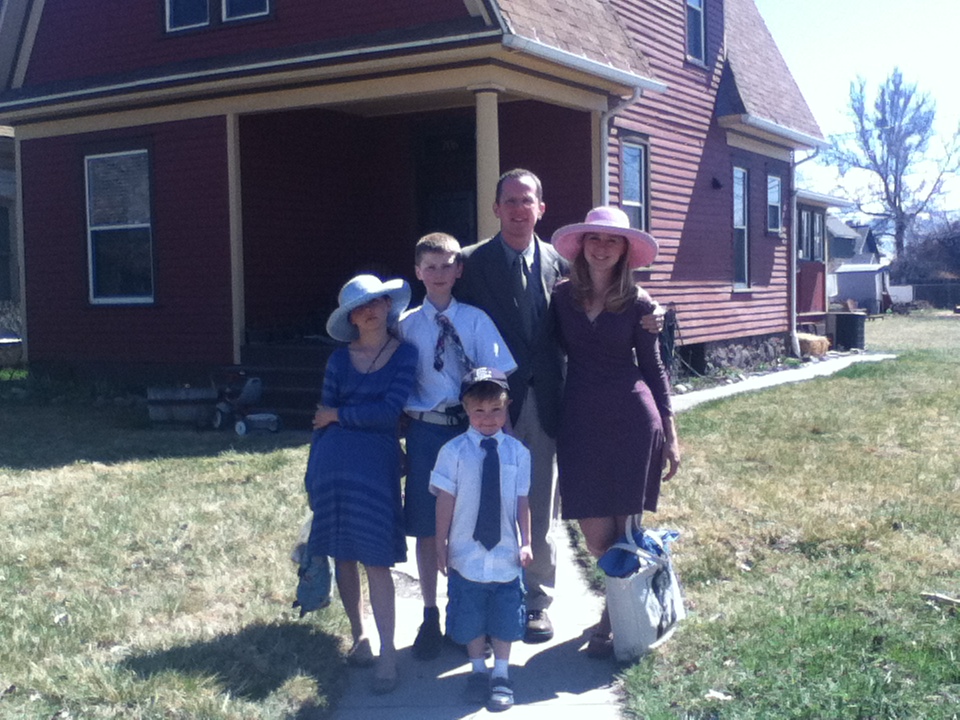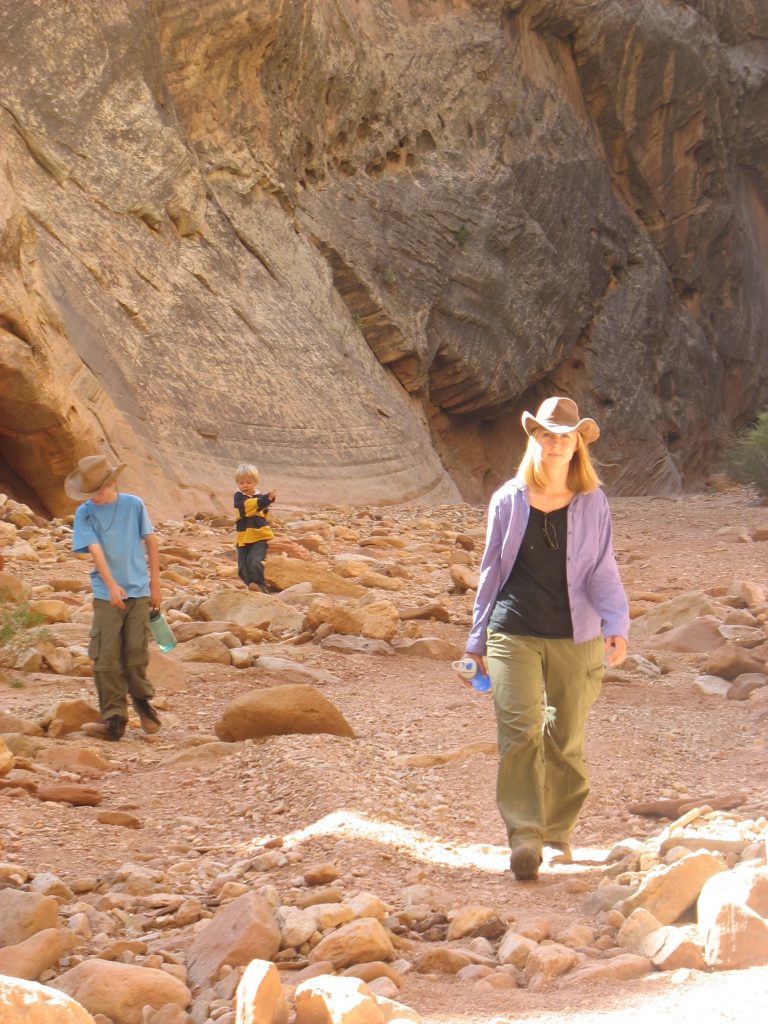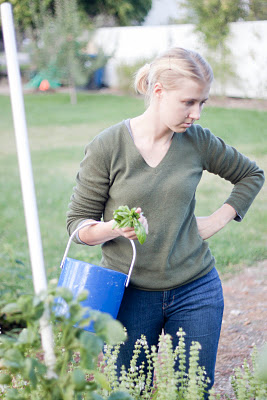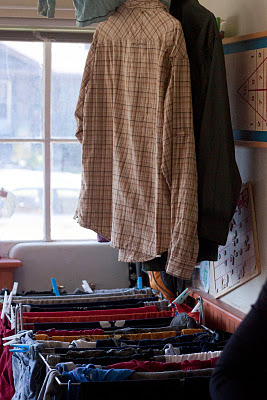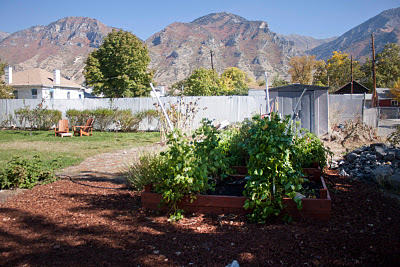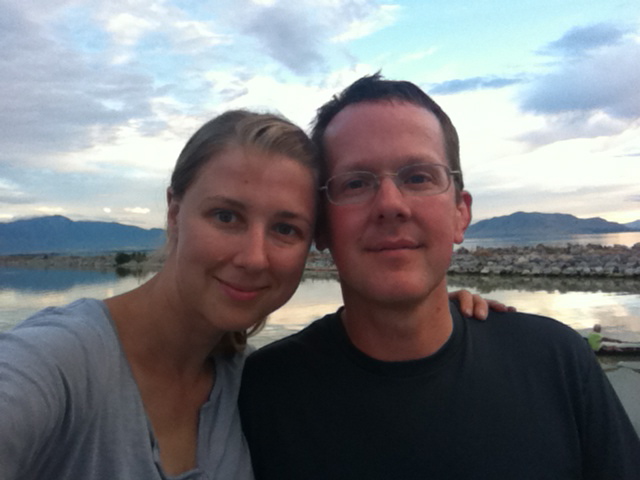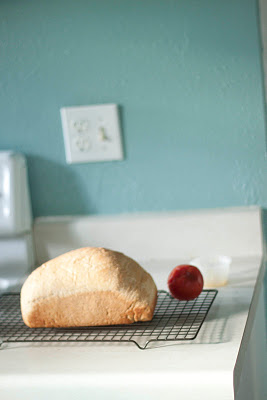Rachel Whipple doesn’t own a dryer or an air conditioner. Why? Because she believes that being a steward of the earth means making do with what she has and providing for herself and her family wherever possible. Rachel also grows her family’s food, bakes their bread, cans, sews, and rides her bike almost everywhere. She speaks movingly about the need for a revival of provident living, government’s role in sustainability, and our responsibility to the poor.
How are you implementing the principle of environmental stewardship into your life?
First off, I have to say that my lifestyle is one of great privilege. My husband has a doctorate and we were able to choose which job we took based on the university that had houses that we could afford to buy within walking distance to the school. Not everyone has the luxury of choosing which job they’re going to go to and which city to live in, but we did. So we made sure that we took a job in a place where we could buy the house outright. We bought a little house in the downtown area so that my husband has a fifteen-minute walk to work. The kids and I walk or bike to school and almost everywhere else we go.
Where do you live?
We live in Provo, in downtown Provo, in one of the old pioneer neighborhoods in a house that was built in 1904. It’s an old and horribly inefficient house but we are trying to revive it, because I believe that it’s better to care for something and build it up and make it better than it is to tear things down and throw them away. So we bought an old house. We walk and bike everywhere. We have our little garden that we grow things in and I get to do canning. A lot of our clothes are second hand and it’s been that way for years because we went to grad school and we had no choice most of the time. But if you know how to sew then you can get second hand clothes and mend them or alter them to fit and you’re good.
So you’re a mother, how many children do you have?
We have three children. They’re 13, 11, and 6 and they’re all three in different schools right now. One does ballroom, two of them do voice lessons and we have got wrestling starting up next month and then swimming lessons. When a lot of families hit this time of life, the moms spend their lives acting as a chauffeur and just driving from one after school activity to another. We have been really careful about which activities our children do so that we can avoid driving and so that we can spend more time together. So with my youngest son’s swimming lessons, the older kids go to the rec center with us and they get to swim or play racquetball while he is doing his lesson. The rec center is a mile and a half from our house. We just ride our bikes over.
Even in the winter?
Well, sometimes we walk depending on the conditions. We walk all winter long. We don’t drive the car very much.
Do you own a car?
We do have a car. Our car is a 1999 and it has 200-and-something thousand miles on it. It’s fantastic. But it’s totally solid. It’s paid for so we don’t see the point in buying anything newer or more efficient especially because we drive it so seldom. So we just keep it for doing road trips.
How about getting up to Salt Lake City? What about those sort of mid distances where it’s not a road trip but it’s not school and work?
Well we usually just ride the train. We live seven blocks away from the Frontrunner station. Other than that, we don’t really go to Salt Lake that often. We really want to be rooted. We’re the kind of people that like to settle into a place and stay there. Our grad school and postdoc experiences were hard because we knew we were only there temporarily. But now that we have finally moved some place and bought a home, this is where we are. We are really investing a lot of our time and energy in getting to know our neighbors and to being part of our community here. So while we do occasionally go up to Salt Lake to go to the museums or to see plays, for the most part what we do is in our community.
Can you tell me a little bit about the impact that this is having on your children?
I know a lot of people who wouldn’t allow their children to go anywhere by themselves. My 11-year-old daughter will often ride her bike to school and her school is three miles away from our house. She does that on her own. She started by riding with a friend who lives a mile and a half away, and then her friend and her friend’s father would ride the rest of the way with her. That was how she started riding the bike to school. So it was a safe introduction to it and now she does it on her own.
I was taking public transportation to school when I was 11. So you’re speaking to someone who has no problem with that at all.
Well, I think it just depends on the relative standards of the community. Where we are here, it’s very unusual that my older two children have that much freedom. But Monday night for our Family Home Evening activity we rode up to The Riverwoods, a collection of shops five miles from our house, and bought a hot chocolate that we shared and then rode back. We talked the whole time; we were talking while we were riding. And my son who is 13 said, “Mom, I’m really glad that you’re my mom,” and I’m like, “Really? Because you were complaining when we started this bike ride.” He’s like, “Yeah, but I can go anywhere.” He walks a mile and a half to his school, and after school he will go to the library or to the comic bookstore and relax a little bit before he comes home at four. He realizes his friends don’t get to do that. He has got a lot more freedom, and my older two have about a five mile radius they can go on their own. We have safe routes mapped out for them. They have a lot of freedom that most kids don’t get until they’re 16. We ride together as a family a lot so they know how to do that safely.
I would love to hear more about the other practical approaches that you employ in your home. You talked about clothing and canning …
Clothing, canning, and doing laundry. We don’t have a dryer. We had a horrible dryer in our house when we moved here and it finally died. I had racks to hang clothes on in the summer so I brought them into our house in the winter to see if it would work when that stupid dryer died and it totally worked. So we got rid of it and now we hang all of our clothes to dry. I like it. In the summer, that makes hanging the laundry an outside activity and it’s so much more satisfying than sitting on a bed over this huge pile that you’ve got to fold. So that’s one thing that we do that’s a little unusual. I cook all our food. That’s a good Mormon house wifery kind of thing to do. I bake all of our bread; I make granola, so we don’t eat cereal. It’s those things that seem like a real waste of money because they are so empty. It’s so much air.
So tell me about your motivation? Have you thought about every single one of these things or is this a holistic strategy to live more responsibly?
There are a lot of different factors. I think part of it is because I was raised by parents who were strongly influenced by President Kimball, who, in 1976, gave his talk on self-reliance or self-preparedness. That’s where he told everyone to plant trees, and fruit vines, and have a garden, and take care of your homes, and your lawns. Make it beautiful, keep it painted. So I was raised that way and I’ve brought that into my family: this sensibility that we take what we have and we make it good and productive and better. Another part was practical in that being a grad student family for six years and then a postdoc after, we had to be very provident in our living, to use the LDS term.
But part of it is I’ve always been drawn to this idea that we have to love and take care of this Earth. I was raised in a little town in rural Texas and I was part of the recycling committee where we started collecting the cans and cleaning them out. It was a radical idea in our town at that time, but I really felt like we needed to do something like this. Then I went to college and studied Geology at BYU and in one of our classes we toured landfills and mines at Yucca Mountain. I saw one landfill where these giant pits were full of sorted recycled bottles: things people had taken the time to rinse out and sort and there they were in a landfill because it wasn’t cost effective enough to actually recycle them and to use the material again. It was so heartbreaking to my poor young little idealistic self. I was like, What is the point of all of this? As I have gotten older, I got over that very sad moment and become more pragmatic about it, but I’m still passionate. I think that if I can be conscious is my decisions, I can help my family and have a better effect on the world around me. In our church we believe strongly in this idea of agency, choice and accountability, and personal responsibility. I can’t save the whole world. I can’t change everyone’s actions. But I can make sure that what I am doing is responsible and is in line with what I believe. It’s not going to make everything better but it will absolve me a small degree of guilt.
Recently I’ve started writing publicly and speaking on radio shows and in different forums about LDS environmentalism, acting as an unofficial representative of the church and saying we do care about environmental things, because I believe we do. The reason I care about this is because I’ve been raised in this church with this faith, with this song: “My Heavenly Father loves me.” “Whenever I hear the song of a bird…” Everything in this world is a testament of God’s love to us and our reasons to love him.
Do you see that same strain of self-reliance and respect for our earthly environment in the Mormonism of 2013 contrasted with the Mormonism of 1976? Or do you think that President Kimball’s focus has been morphed into other things?
What we have since 1976 is a strong shift to a disposable consumer society in the United States. Our church culture has gone along with that to an extent, which is really unfortunate because we do have these doctrines and the model in our pioneer forbearers of self sufficiency, self reliance. We come from a very agrarian based church where most of our people were ranchers, and farmers, and intimately connected to the land. Now we are a church that is run largely by businessman and it’s got a really strong business management culture that’s removed from the land. But there is still a very strong desire in our people to craft and make things. We have this whole new trend of new domesticity and the mommy blogs. Provo has got a ton of those, where you have women trying to reintegrate these skills of house wifery into their lives in a very attractive way. I think that that speaks to our need to still be connected to the land and to do work within our homes that’s real and substantial and isn’t just a commodity.
Tell me about your advocacy effort. What is your goal in speaking out about this? Where do you speak out about this and what is your approach?
We are told to be actively engaged in a good cause, but we are very suspicious of activists because we are a conservative people who like stability and order and are skeptical of anything that sounds like a radical change or an imposition on our agency, which is how a liberal agenda or an environmental agenda is often viewed. Those ideas have become politicized and so people won’t even listen to them if they think politics is where they’ve come from or where they’re going. My idea is to show that these simple things – like how you do your laundry, how you take care of your home, how you feed your family – are not extreme, and they make our lives better and they’re in line with the gospel teachings. As we walk more, we know our neighbors and we’re building more of a sense of Zion and community and that’s incredibly valuable. I want to show people that they can do these things. It’s not that hard to add a bike ride with your family if you’ve already got the bikes. If you don’t have the bikes, it’s not that hard to go for a family walk. When you do that you’re spending time together that’s qualitatively different than when you are riding in a car together and everyone is watching their little videos that pop down from the ceiling or playing on their Gameboy devices. I think we’ve forgotten we can do that. Let’s start doing that again.
I also want Mormons to realize that it’s good to love and care for this earth. It’s good to be socially responsible, to be aware of your consumption. Those things don’t make you automatically opposed to the Church, or for abortion, or any other political things like that. We have all of these political associations in our minds so firmly engrained that we don’t even listen to each other. By talking in Mormon terms to Mormons and testifying in a very quiet way, I feel I can make a difference. Offering these ideas but not telling anyone what to do, I find that offering a range of ideas is much more effective than telling all of us we have to stop driving our cars to church. Many of us here live blocks away. But nobody is going to listen to that. They should, but they won’t. So it just requires patience and humility and knowing that a lot of things have to bow to practical concerns of daily living. Paper plates are horribly wasteful but when you’ve just had your fourth baby then, yeah you break out the paper plates and you are completely justified in that and I am not going to condemn anyone for doing that. We have different demands and we all have to balance that. So I don’t feel comfortable with imposing my choices on anyone else but I want them to see that my choices are viable and that they could do them too.
I’ve grown into our current practices, and honestly I have a long way to go. We are still very wasteful, profligate Americans. I have more pairs of shoes than my husband; he has pretty much exactly the number of pairs of shoes that he needs. Why do I need more than he does? Well, because I feel like I do. It’s just an entitled attitude. So we can definitely do better and everything is a process. There are a lot of things that we assume we need in our society but we really don’t. We don’t have to have two cars. We don’t have to have a dryer. If we lived in the South where it is humid we would probably feel differently. We don’t have to run our air conditioner because we live in a dry enough climate where the air cools down at night so that we can open our windows and turn on the fans and the house will cool off too. So we don’t need those things but people assume that you do. I want them to see that those assumptions aren’t always justified.
What do you feel is the role of government or legislature in this discussion?
I’m on the Sustainability and Natural Resources committee that advises the Mayor of Provo, and I work with the bike collectives and the bike committee. In fact, I’m meeting the Mayor at noon today to talk about the bike master plan and some changes on one of the streets here in the city. That’s relatively new for me. Previously, I was just going to City Council meetings and other meetings and trying to learn and get informed and settle into my community. I think that all of the important work of government happens on a local level. We need to know who our city council people are, our mayor, and they need to know us because that’s the only way that they are held accountable. It’s also how they know what standard we are holding them to. If they don’t know the things that matter to us then don’t know what they’re being judged against.
As far as national politics, I find that whole thing very, very depressing. It’s so so sad. I think that there does have to be a role for government in regulations, because many industries and business have proven themselves to be more invested and concerned about immediate profits and short term gains then they are on the long term costs. Actually, I would include in that even the long-term welfare of their own companies and the communities in which they operate. And because many companies don’t have that vision and that kind of discipline, I think that that has to be imposed externally. I would love to be a libertarian but I think that can only work on a small scale, and our county has grown past the scale where that is a viable option. I think that’s sad and it says something really sad about my belief in human goodness but there it is. So I’m for government regulation and things like the EPA and OSHA. But regulations are there because somebody does something stupid and then everyone has to suffer for it. We’ve got to be grown up enough to recognize that we suffer the consequences of bad actions of others in the past. That’s the way it is with the environment too. If we are making collectively irresponsible environmental choices now then we collectively will be paying for that in the future.
The people who end up paying the most are the ones who can’t avoid paying, the people who are poor and disenfranchised and already living on the edges, on the margins. These are the people who are our brothers and sisters; these are the people Christ would be ministering to if he were here. We through our selfishness are causing them harm, and that is something that we will be held accountable for. The Doctrine & Covenants is very clear that we have enough on this earth for all of us if we live according to God’s instructions and his commandments, and we know we’re doing things right if there are no poor among us. As long as we have poor in our community, people who are struggling to survive, people who don’t have enough, when we have more than enough, then we are condemned in the harshest language possible and that terrifies me. I think that if we individually are not all stepping up in our personal lives to do what we can to be responsible, then there has to be some external agency that will secure at least a minimal level of accountability, and that’s what the government has to do. We have to be informing those conversations in government and speaking to our legislators and honestly speaking to things like the Sierra Club, the NRA, and other organizations that have developed a lot of political clout and power. We need to be speaking to them as well as to our elected representatives because that’s how we are going to affect change. That’s how we are going to protect people on a larger scale than we can within our own little families and our own little communities. And it’s incredibly depressing to think about it that way. To hear the new stories of pain and suffering throughout the world and to feel helpless in the face of that… We have to push pressure on our leaders, we have to live responsibly in our own lives, and we have to help the people that we can.
I was raised in the church reciting the Young Women values, and the idea of integrity is, I think, one of the most important values. We try to make our actions consistent with our beliefs and we have an obligation to get knowledge, to be informed so that our choices are well-founded. I think that in our church we have a really good opportunity to meet at the intersection of prudence – which is our provident living teaching – and altruism – which is our care for other people and stewardship. We need to act like none of this is ours, that we have an obligation to care for it, and that we will be held to account for how well we do that. They boil down to simple rules: Don’t break something you can’t fix. If you do break something, try to make restitution. We are a church of the restoration, right? We should do act on those principles of restoration, of bringing things back, in everything that we do. If we want to see the Tenth Article of Faith be a reality, that the earth will be a paradise again, then we need to work at planting gardens and making this place a beautiful paradise where we could receive Christ and he would see that it’s good. I think that if we do these things and we are able to delay our own self-gratification, we will be happier now. We will be doing good for others.
We talk a lot about our pioneer heritage and what the pioneers gave to us. We need to think about the heritage that we are passing on into the future. We have our genealogy scriptures where we turn the hearts of the children to the fathers, but a lot of times we need to think that we are the fathers in those scriptures. We need to look forward because the sins of the fathers are visited on future generations. That’s pretty clear in the Old Testament. I remember reading that when I was younger and wondering how could God be so cruel to visit retribution on people who hadn’t done anything wrong, but it’s not a matter of God’s malice. It’s just a natural consequence of choices and actions and we don’t want our actions to hurt others in the future. We have a strong philosophical and moral basis to do good and to believe in doing good to others. It should be enough to get us to act.
At A Glance
Rachel Mabey Whipple
 Location: Provo, UT
Location: Provo, UT
Age: 34
Marital status: Married 15 years
Children: Jacob 13, Claire Elan 11, and Isaac 6
Occupation: homemaker, housewife, student, volunteer
Schools Attended: BYU
Languages Spoken at Home: English
Favorite Hymn: “Simple Gifts” or “Come Thou Fount”
On The Web: www.ldsearthstewardship.org
Interview by Neylan McBaine. Photos of Rachel’s home by mirielle-sanford.squarespace.com
.
At A Glance

